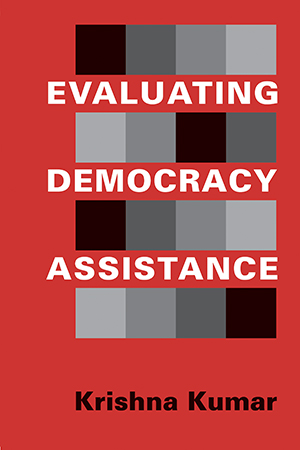With the international community providing billions of dollars each year to promote democratic institutions/cultures in transitional and developing countries, rigorous evaluations have become essential for determining the effectiveness, as well as the future direction, of democracy assistance programs. Krishna Kumar provides a unique, practical guide to the on-the-ground tasks of evaluating and monitoring these programs, from planning to implementation to preparing and presenting evaluation reports.
Kumar assesses virtually all of the evaluation and monitoring approaches currently in play, pointing out the strengths and weaknesses of each and suggesting alternative approaches where appropriate. Packed with valuable insights, his book will serve as an essential tool for those who are involved in democracy assistance programming and evaluation, fund it, or simply want to learn more about it.
Krishna Kumar is senior evaluation adviser in the Office of Foreign Assistance Resources, US Department of State. His recent publications include
Promoting Independent Media: Strategies for Democracy Assistance and the coedited
Promoting Democracy in Postconflict Societies.
Also of interest:
Transacting Transition: The Micropolitics of Democracy Assistance in the Former Yugoslavia by Keith Brown and
Promoting Democracy in Postcommunist Ukraine by Kateryna Pishchikova
No rights in India."A valuable guideline for practitioners who need to evaluate democracy assistance and for scholars who need to study the details of democracy promotion.... Kumar skillfully constructs a toolbox for democracy promotion evaluators." —Nelli Babayan, Democratization
"[Kumar] provides us with a very thorough and easily understood handbook on the evaluation of democracy programs, which is richly illustrated with case studies that are presented with sufficient detail to help readers understand the specific political, economic and often emergency contexts within which each evaluation was designed and implemented. In fact the very thorough way in which each stage of the evaluation process is discussed also makes this a very useful introductory text for evaluators working in other sectors."—Michael Bamberger, American Journal of Evaluation
"Timely and important…. Dr. Kumar's clear and thoughtful explanations of how monitoring and evaluation practices can be applied to the democracy and governance sector are an invaluable resource."—Lorne W. Craner, International Republican Institute
"An insightful and informed review, grounded in real-world experience, of how to evaluate the complexities of democracy support programs overseas."—Kenneth Wollack, National Democratic Institute
"Three things set this book apart from all the skepticism and fluff out there. First, it is on the cutting edge of evaluating democracy assistance, showing that it can be done and how to do it. Second, it goes beyond tools and methods, which are useful but not enough, to show that evaluation is about strategic thinking and evidence-informed action. Third, the author knows what he's talking about, drawing on his vast experience and deep knowledge to illustrate the guidance offered. In brief, this book integrates theory and practice on a critical issue of global importance: strengthening democratic institutions."—Michael Quinn Patton, Author of Developmental Evaluation: Applying Complexity Concepts to Enhance Innovation and Use
"The most probing, comprehensive study to date of the vexing challenge of evaluating democracy assistance programs. Kumar moves skillfully from a full recognition of the myriad pitfalls and dilemmas in this domain to a rich set of constructive ideas and recommendations."—Thomas Carothers, Carnegie Endowment for International Peace
"Krishna Kumar's book fills a serious gap in the literature on evaluating the democracy promotion programs that have proliferated in the donor community."—Harry Blair, Yale University








